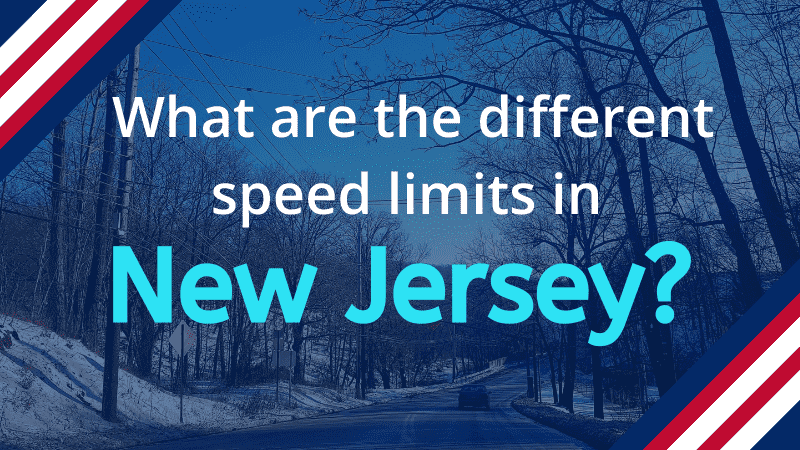Planning a trip to New Jersey? Maybe you are considering a move to the state or have only just relocated.
No matter the reason, there are many things to look forward to when you are in the Garden State such as amazing beaches, long coastal walks, hikes through the beautiful rich forests, and stunning national parks.
If you have just moved to New Jersey, are planning your next trip there, or simply driving through the state, there is a lot to think about, but one of the considerations you absolutely need to be aware of is the New Jersey speed limit and the various maximum speeds you can travel on different roads and areas within the state.
If you are a driver, planning on learning how to drive, or, are preparing to drive whilst visiting the state, then knowledge of the different speed limits in New Jersey is vital, whether you are driving through cities, on highways, or in any of the rural communities as the speed limit will likely vary depending on where you are and which road you are driving on.
Speeding in New Jersey, similar to most places in the US, can result in some hefty penalties and fines, and you do not want to receive a speeding ticket in New Jersey as it can result in your license being suspended due to an accumulation of points!

Knowing the correct New Jersey speed limit is not only about avoiding punishment. It is also about driving safely on the roads to prevent accidents. Driving within the maximum speed limit helps reduce the possibility of crashes and ultimately saves lives.
In New Jersey, legislation is put in place to govern the safe use of the roads. Speed limits in school zones, for example, are established by the New Jersey Department of Transportation within the official government website. The different limits highlight the fastest speeds you are legally allowed to drive when the conditions are ideal and the visibility is also good.
Obviously, a specific New Jersey speed limit does not mean that you have to drive at that exact limit all of the time. You still must assess the road conditions, weather conditions, and the surrounding environment to determine the best and safest speed at which to drive (that is also within the maximum prescribed limit).
Different speed limits are implemented based on several factors, including population density and type of road. For each community and highway, the speed limits are often posted on prominent signs along the roadway.
What are the different speed limits in New Jersey?
Speed limits in New Jersey range from a low of 25 mph to a maximum of 65 mph, depending on the type of area and zone you are in, or the vehicle you are driving. Here is a breakdown:
- 25 mph is the maximum speed limit in New Jersey school zones, and some business, or residential districts.
- Some residential and business district areas follow a maximum speed limit of 35 mph.
- 50 mph is the speed limit on all other roadways.
- 55 mph is the limit for certain state highways, and all interstates, you can find the specific highways these limits apply to on the Department of Transportation section within the Government website.
- The highest speed limit you can legally drive at is 65 mph, which applies to certain highways indicated on the website.
With these different speed limits implemented in New Jersey, it is important to pay attention to road signs. The last thing you want is to be slapped with a huge fine as a result of exceeding the speed limits in New Jersey through a lapse in judgment or concentration.
It is important to be aware that a New Jersey speeding ticket can be issued to you for going just 1 mph over the prescribed speed limit in New Jersey. Here are the penalties depending on the speed at which you are going:
- $85 for going 1-9 mph over the speed limit.
- $95 for going 10-14 mph over.
- $105 for going 15-19 mph over.
- $200 for going 20-24 mph over.
- $220 for going 25-29 mph over.
- $240 for going 30-34 mph over.
- $260 for going 35-39 mph over.
In addition to these fines, if you are going 10 mph or more over the statewide speed limit of 65 mph, your fine will double. For example, if you were going 85 mph in the 65 mph zone you would have to pay $200 because that is the fine for surpassing the limit by 20 mph. However, you would have to then pay an additional $200 on top of this due to the rate doubling because you were on a 65 mph road, so, in total, you would be out-of-pocket for $400!
Not only will you be charged with a hefty fine for abusing the speed limits in New Jersey, but you will also receive points on your license!
If you cause a speeding violation in New Jersey, it will result in a minimum of 2 points on your license due to it being classed as a minor traffic violation. If you receive any points on your license, they will usually stay on your record for 6 years. Receiving points on your license is not worth it and will cost you more money by raising your insurance premium, so be careful!
Here is a table with the speeding violations and how many points you will receive on your license if you do not abide by the New Jersey speed limits.
| New Jersey Speeding Ticket Points | Total Points |
|---|---|
| 1-9 mph | 2 |
| 10-14 mph | 2 |
| 15-19 mph | 4 |
| 20-24 mph | 4 |
| 25-29 mph | 4 |
| 30-34 mph | 5 |
| 35-39 mph | 5 |
When visiting or relocating to New Jersey, it is normal to think of all the fun things you can do. Knowledge of the speed limits in New Jersey – and adhering to them – will ensure your time is well spent and minimize the chance of you being fined or receiving points on your license.


